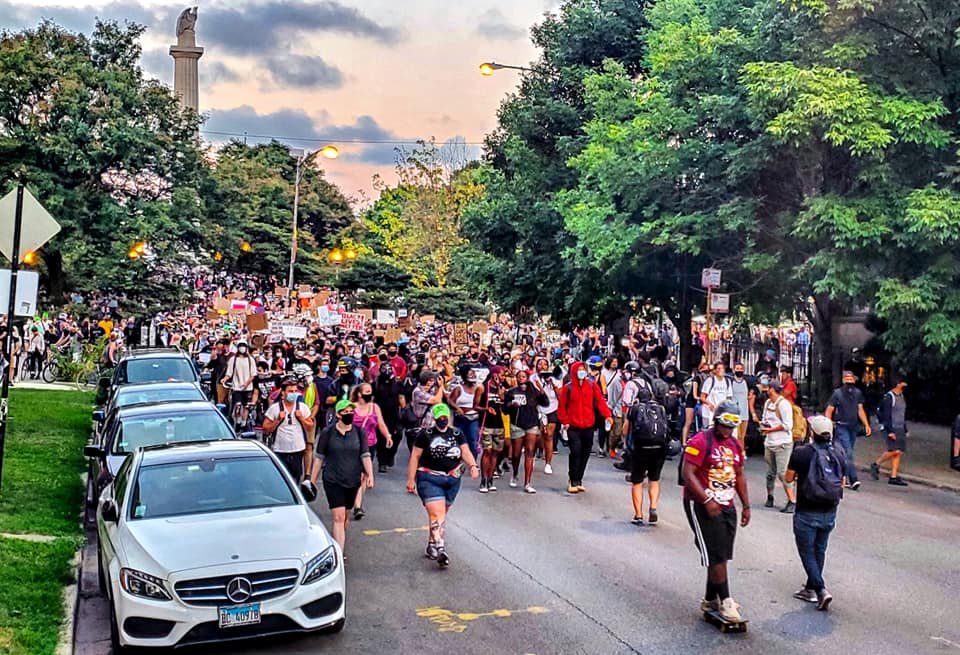
It is important to know your rights so you can be well informed; however, the police can and do arrest folks even if the law doesn’t support them. The time to make arguments and legal defenses is in the courtroom, after the arrest or citation.The information in this guide is intended to inform social justice activists and is not a substitute for legal advice from a licensed attorney.
If you or a friend are arrested at a protest or have a case related to a protest, call 872-4NLG-CHI (872-465-4244) to be connected to legal support through NLG Chicago.
Know Your Rights During a Police Encounter
Police Encounters
Police have the discretion to arrest you or issue a citation. When dealing with the police, you may want to keep your hands in view and avoid sudden movements. You may also want to avoid passing behind them. If you touch the police or their equipment (vehicles, flashlights, animals, etc.), you may get beat up and/or charged with assault or battery. You cannot know for certain what you will be charged with until after you have been arrested. In felony cases, the prosecutor is the only person who can actually charge you.
Stopped on the Street
If you are stopped on the street, you can and should ask if you are “free to go.” If the answer is yes, consider just walking away. If the police say you are not under arrest, but are not free to go, then you are being detained (police are temporarily restricting your movement). The police can pat down the outside of your clothing if they have reason to suspect you might be armed and dangerous. If they search any more than this, say clearly, “I do not consent to a search.” They might keep searching anyway. If you resist, you might be charged with assault, battery or resisting arrest. You do not have to answer any questions. You do not have to open bags or any closed container. Tell the officers you do not consent to a search of your bags or other property.
Identification
Police can ask you to identify yourself, but you do not have to answer them. You can provide your name and date of birth; don’t provide more information than that. If you choose to provide information, don’t lie; police may arrest you for obstructing an investigation. The safest choice is to say nothing or give only your name and date of birth, nothing more. If you are going to hand an officer your ID, say so, and do not reach into your pocket until you tell the officer what you’re doing.
Police Interrogations & “Miranda” Warnings
If you are questioned by the police on the street or after you have been arrested, you should not talk to the police and assert your Fifth Amendment right to remain silent by saying, “I am going to remain silent. I want to see a lawyer.” (Note: You must affirmatively state that you will remain silent in order to properly assert your Fifth Amendment rights.) The police do not have to read you your rights (a “Miranda” warning). The police regularly intentionally violate Miranda, and though your rights have been violated, it’s possible that what you say can be used against you. For this reason, it is better not to wait for the cops to tell you your rights. You can invoke them by using the language above.
Immigration Status Questions
Regardless of if you are undocumented, out of status, a legal permanent resident (green card holder), or a citizen, you do not have to answer any questions about your immigration history.
Police Mistreatment
You have the right to ask for an officer’s name and badge number. If you are mistreated, try to obtain this information as well as contact information for witnesses. If you resist or fight back, you can be charged with assault or battery to an officer.
Recording Police Activity
It is a protected right under the First Amendment to record police officers when they are performing duties related to their job. Despite this, it used to be a felony to record police under Illinois law, and many cops still respond as though it is illegal for you to film them. Despite the fact you can no longer be directly charged for recording police, officers have many other discretionary charges (such as disorderly conduct) that they can use to get you off the streets in that moment.
Potential Charges
Although you have a right to peacefully protest, there are several possible charges that you may face from protest activity. Disorderly conduct is the most common charge protesters face. Some other potential charges are listed below, but this list is not exhaustive. Note that some charges are possible violations of both City of Chicago ordinances and Illinois state laws.
Disorderly Conduct
Under State law, it is a crime to “do any act in such unreasonable manner as to alarm or disturb another and to provoke a breach of the peace.” Potential consequence: between 30 and 120 hours community service; up to 30 days in Cook County jail. Chicago ordinance prohibits “breach[ing] the peace” by acting in an “unreasonable manner.” Chicago ordinance also prohibits failing to disperse when three or more persons are committing “acts of disorderly conduct” that are likely to cause “substantial harm” nearby. These ordinance violations are punishable by up to a $500 fine.
Criminal Trespass
Under state law, entering or remaining on property after being told to leave or learning that one’s presence is forbidden is punishable by up to 6 months jail and/or a $1,500 fine. The penalty increases to up to one year and/or $2,500 for land or buildings funded in part by state money. City ordinance also prohibits trespassing, punishable by a $100-$500 fine.
Storing Supplies
Under Chicago ordinance, you cannot use a public way to store personal property, goods, boxes, crates, packages or other obstructions. Potential consequence: between $50-$250 fine for each offense.
Building, Structures, and Tents
Under Chicago ordinance, without a permit, you cannot erect any structure or stationary object on a public way in the city. Potential consequence: between $50-$500 fine for each offense. Each day that a tent is erected is a
separate offense; owner responsible for any costs involved in removing the item.
Resisting Arrest
Under state law, it’s a crime to resist or obstruct a police officer. Potential consequence: up to one year in jail and/or a $2,500 fine. City ordinance also prohibits resisting police, punishable by a $25-$500 fine.
Reckless Conduct
Under state law, a person commits reckless conduct when they act in a way that “cause[s] bodily harm” or “endanger[s] the safety of another person.” Potential consequence: up to one year in jail, a $2,500 fine, or both.
Mob Action
Under state law, it’s a crime to use “force or violence” to disturb the public peace with 2 or more people, or to gather as a group of 2 or more people to commit or help others commit a crime. Potential consequence: felony charges and up to 3 years prison if force or violence is used; up to 364 days in jail for gathering to commit or help commit a crime.
Other Potential Consequences
Residents of public housing or those who use subsidized housing vouchers may have problems with their eligibility or renewal for those programs after being arrested for or convicted of a charge that includes allegations of violence.
Students currently enrolled in CPS could face school disciplinary proceedings for protesting on or off school property. Also, protections for First Amendment activity are less robust for students in school. Restrictions on police searches are also weaker in schools, meaning that students (and their bags and lockers) can be searched without the same suspicion required on the street.
Trans* and queer folks may be jailed with people of their birth gender regardless of their gender identity or wishes, or isolated, though the Cook County Sheriff’s policy is to consider gender identity.
What to Expect if Arrested
The Chicago Police Department can hold you in custody for up to 48 hours without charging you. Typically, you will be released after 3-18 hours, though this period could be longer if you have an outstanding warrant, are charged with a serious crime, or if processing is delayed due to mass arrests.
You will not have access to your personal effects– everything but the clothes you wear will be confiscated, and not returned until you are released.
You will not have your phone, so write a contact number on your arm so you have a number to call (phone calls are usually allowed only after many hours in custody).
You probably will not have access to medications or medical care–it’s up to the police, and they are not generous with attention to medical needs. Tell the officers at the station if you are taking any medication or need immediate medical attention.
It’s best if a friend (who will not be arrested) knows your name and whereabouts. They can call the Public Defender’s Station House Unit 847-817-4448 on your behalf.

